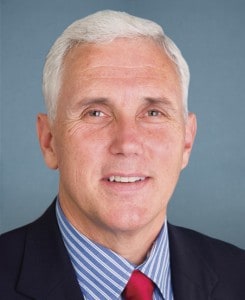In March of 2015, barely one year ago, the Indiana Legislature passed a Religious Freedom Restoration Act [RFRA], a law that informs and guides state courts in religious liberty cases. The law “allows individuals and companies to assert that their exercise of religion has been, or is likely to be, substantially burdened as a defense in legal proceedings.” This places a measure of restraint on government so that it isn’t totally free to compel a person or a business to act in ways that violate its religious beliefs. Even so, the law didn’t give any person or entity total freedom to discriminate, either. In fact, more than one law professor favoring same-sex marriage also supported Indiana’s RFRA.1,2
Indiana governor Mike Pence signed the bill into law on March 26, 2015. A great deal of misinformation had spread about the legislation and what it actually would do, and as a result the new law was seen as discriminatory against gays and lesbians. After a huge outcry from Big Business that included economic threats against the state, an amendment was to the bill was passed and signed into law by Governor Pence. Religious liberty advocates were very concerned about the amendment; essentially they declared it would change the law, which they saw as balanced to begin with, into one that authorized unjust treatment of Christians. Pence signed this “clarification” of Indiana’s recently-passed RFRA on April 2, 2015.
One of the companies that objected to Indiana’s RFRA was Apple Computer. Apple CEO Tim Cook even penned an op-ed piece published in The Washington Post titled “Pro-discrimination ‘religious freedom’ laws are dangerous.” Apple was one of many companies that protested the law, but the lessons that arise from Apple’s objections are especially instructive for us, even a year later, as we will see.
Ryan T. Anderson of the Heritage Foundation wrote an article exposing the hypocrisy of these companies. In the article, he cited the plight of Baronelle Stutzman and others who have been penalized for running their businesses according to her own beliefs and consciences. Anderson declares,
Ryan T. Anderson
Cook, astonishingly, equates [the belief that marriage is between a man and a woman] with Jim Crow segregation. He writes: “The days of segregation and discrimination marked by ‘Whites Only’ signs on shop doors, water fountains and restrooms must remain deep in our past.”
This debate has nothing to do with refusing to serve gays simply because they’re gay, and this law wouldn’t protect that. But should the government force a 70-year-old grandmother to violate her beliefs? Should the government coerce her into helping to celebrate a same-sex wedding?
A Religious Freedom Restoration Act could protect her. But it might not. The law doesn’t say who will win—only that a court should review, using a well-established balancing test, and hold the government accountable to justify its action.
What’s most amazing in the debate over Indiana is the level of hypocrisy. Businesses are saying they’ll boycott Indiana over this religious liberty law. So they want the freedom to run their businesses in accordance with their beliefs—so they’ll boycott a state that tries to protect that freedom for all citizens? Do they not see that the baker, photographer and florist are simply asking for the same liberty?
Indeed, Apple itself has exercised this freedom (or is the proper word, according to Cook, “discrimination”?). After all, Apple removed the Manhattan Declaration app from its App Store. Apple decided that a Christian app bearing witness to the dignity of unborn life, the nature of marriage as the union of husband and wife and the centrality of religious liberty was incompatible with its mission. So they “discriminated” against the Manhattan Declaration.
No one suggested that this should be made illegal. Even if we thought it a misguided decision, we thought Apple should be free to decide its own values and live according to them.
Cook, however, sees no tension when he writes “Our message, to people around the country and around the world, is this: Apple is open. Open to everyone, regardless of where they come from, what they look like, how they worship or who they love.” Apparently unless they are traditional Catholics, Evangelicals and Orthodox Christians who support the Manhattan Declaration. Then Apple’s message is “Apple is closed. Closed to those with beliefs we disapprove of.”
Other observers as well3,4,5 saw through Tim Cook’s rhetoric and exposed it for what it was and is—blatant hypocrisy. It’s bullying, too—but in this post I’d like to focus primarily on the hypocrisy that pervades this kind of battle, one that is becoming all too commonplace.
This page is part of a larger article, which you can access here.
Notes:
1http://www.indystar.com/story/opinion/readers/2015/03/07/indiana-needs-religious-freedom-legislation/24477303/
3http://factn.org/apples-ceo-needs-to-eat-his-words/
4http://www.worldmag.com/2015/03/the_hypocrisy_of_indiana_s_corporate_critics/page1
Copyright © 2016 by B. Nathaniel Sullivan. All Rights Reserved.

